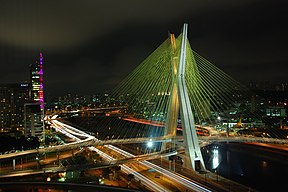
Back سايبربانك Arabic Kiberpank AZ Кіберпанк BE Кібэрпанк BE-X-OLD Киберпънк Bulgarian সাইবারপাংক Bengali/Bangla Cyberpunk BR Cyberpunk BS Ciberpunk Catalan سایبەرپەنک CKB
Cyberpunk is a subgenre of science fiction in a dystopian futuristic setting that tends to focus on a "combination of lowlife and high tech",[1] featuring futuristic technological and scientific achievements, such as artificial intelligence and cyberware, juxtaposed with societal collapse, dystopia or decay.[2] Much of cyberpunk is rooted in the New Wave science fiction movement of the 1960s and 1970s, when writers like Philip K. Dick, Michael Moorcock, Roger Zelazny, John Brunner, J. G. Ballard, Philip José Farmer and Harlan Ellison examined the impact of drug culture, technology, and the sexual revolution while avoiding the utopian tendencies of earlier science fiction.
Comics exploring cyberpunk themes began appearing as early as Judge Dredd, first published in 1977.[3] Released in 1984, William Gibson's influential debut novel Neuromancer helped solidify cyberpunk as a genre, drawing influence from punk subculture and early hacker culture. Frank Miller's Ronin is an example of a cyberpunk graphic novel. Other influential cyberpunk writers included Bruce Sterling and Rudy Rucker. The Japanese cyberpunk subgenre began in 1982 with the debut of Katsuhiro Otomo's manga series Akira, with its 1988 anime film adaptation (also directed by Otomo) later popularizing the subgenre.
Early films in the genre include Ridley Scott's 1982 film Blade Runner, one of several of Philip K. Dick's works that have been adapted into films (in this case, Do Androids Dream of Electric Sheep?). The "first cyberpunk television series"[4] was the TV series Max Headroom from 1987, playing in a futuristic dystopia ruled by an oligarchy of television networks, and where computer hacking played a central role in many story lines. The films Johnny Mnemonic (1995)[5] and New Rose Hotel (1998),[6][7] both based upon short stories by William Gibson, flopped commercially and critically, while The Matrix trilogy (1999–2003) and Judge Dredd (1995) were some of the most successful cyberpunk films.
Newer cyberpunk media includes Blade Runner 2049 (2017), a sequel to the original 1982 film; Dredd (2012), which was not a sequel to the original movie; Ghost in the Shell (2017); Alita: Battle Angel (2019), based on the 1990s Japanese manga Battle Angel Alita; the 2018 Netflix TV series Altered Carbon, based on Richard K. Morgan's 2002 novel of the same name; the 2020 remake of 1997 role-playing video game Final Fantasy VII; and the video game Cyberpunk 2077 (2020), based on R. Talsorian Games's 1988 tabletop role-playing game Cyberpunk.
- ^ Sterling, Bruce (1986). "Preface". Burning Chrome by William Gibson. Harper Collins. p. xiv.
- ^ Thomas Michaud, "Science fiction and politics: Cyberpunk science fiction as political philosophy", pp. 65–77 in Hassler, Donald M. (2008). New Boundaries in Political Science Fiction. University of South Carolina Press. ISBN 978-1-57003-736-8. See pp. 75–76.
- ^ "Bibliography for GURPS Cyberpunk". sjgames.com. Steve Jackson Games. Retrieved 13 July 2019.
The world of the British Judge Dredd is quintessentially cyberpunk...
- ^ Hague, Angela (2002). Teleparody: Predicting/preventing the TV Discourse of Tomorrow. London New York: Wallflower Press. p. 68. ISBN 1-903364-39-6. OCLC 50497381.
- ^ "CTheory.net". CTheory.net. Archived from the original on 2009-07-22. Retrieved 2009-03-20.
- ^ "DVD Verdict Review – New Rose Hotel". Dvdverdict.com. 2000-01-10. Archived from the original on 2008-12-28. Retrieved 2009-03-20.
- ^ "'New Rose Hotel': Corporate Intrigue, Steamy Seduction". The New York Times. 1999-10-01. Retrieved 2009-03-20.



